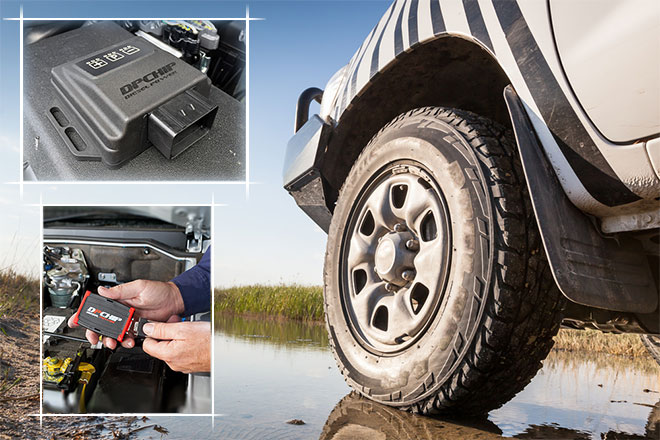-
Your shopping cart is empty!
Power does not come without a price. And in the case of Nissan's hi-tech 2.5-litre common-rail turbo-diesel, as fitted to it's Pathfinder, it's more a question of "Do you really need it?" With 128kW of power and 403Nm of torque the Pathie is no slouch in the grunt department.
For those who do want more oomph, the team at AWDTechnologies, a division of Berrima Diesel, in the New South Wales Southern Highlands, reckons it has the answer with it's DPChip (short for Diesel Power Chip) aftermarket performance chip. The company has a range of DPChips for turbo-diesel vehicles, with it's DP-31 model now available for the Pathfinder (and other common rail diesels). Berrima Diesel claims a lift in power of up to 145kW (up 17kW) and torque up to 442Nm (up 39Nm).
Diesel has been around for more than 25 years, with Reinhard Leimroth and son Andrew earning a reputation for quality work on anything diesel.
There is a plethora of performance chips on the market now, due to the reliance of diesel manufacturers on computer controlled engines, that meet stringent emissions standards. Generally, these aftermarket chips are fitted before the vehicle's ECU and are designed to re-map the ECU to alter fuel flow. This can result in over-fueling of the engine and excessive heat build-up. It may also have a detrimental effect on other parts of the engine management system.
The DPChip is designed to work differently. Berrima Diesel fits the DPChip after the vehicle's ECU. By doing this , the vehicle's engine management system remains unaffected - the vehicle's essential error detection systems and engine safety programming works as normal.
Andrew Leimroth says it's a more reliable way of upping power, without worrying about how the extra grunt affects the engine.
"If something goes wrong with your engine, your vehicle's ECU will put on a warning light...or do whatever it is programmed from the factory to do." Andrew says.
"Those chips that fit before the ECU leave the door open for the ECU to receive false signals and ignore potential problems. The DPChip only alters the signal going to the engine after your ECU has declared everything to be OK. The DPChip is very 'hands off'."
The DPChip software is an adaptive design that alters timing and fuel loading according to driving styles and conditions. These changes are governed by the vehicle computer's output. If you are taking it easy the chip allows for subtle power delivery, but if you plant the foot power is more instant. Importantly, by relying on the signal from the engine computer, if there is any loss of power or a fault, the DPChip responds accordingly.
Verifying power improvement claims is never easy - using a dynamometer will give you an accurate power and torque read out, but it is seat-of-the-pants performance that counts most with drivers. After shelling out for a performance hit, a driver wants to feel the difference in their vehicle's performance.

Lifting the bonnet of Scott's Pathie, it is hard to tell where the extra grunt comes from. The chip sits innocuously in the engine bay, with the attachment cabling the only hint that all is not standard. Fitting takes 10 minutes.
The test loop featured a long, gradual hill climb to start off, followed by undulating roads. For the first loop we turned the DPChip off and drove the Pathie as standard. As stated earlier, the vehicle is no slouch: at half throttle it easily climbed the first hill, topping out at 85km/h from a standing start.
Scott then turned the DP-31's manual adjustment power dial to the '5' setting. The DPChip has 10 settings, ranging from 0 to 9. The top level of 9 is programmed to be well within engine tolerances.
The difference was immediately noticable.At half throttle, the Pathie was significantly quicker, topping the hill at 95km/h.
The throttle response was also far 'crisper', with gears holding longer. We ventured off road to tackle some hills, where the increased torque was noticable low in the rev range, giving the Pathie more tractability.
For turbo diesel owners who want that extra kick, the DPChip is worth considering. Priced at $1495 rrp, it is not cheap, but when you compare it to other options - exhaust systems and intercoolers - it's decent bang for your buck. For more info on DPChip, go to www.dpchip.com or call +61 2 4877 1022.
Disco Dancer -
Short term testing of any performance product provides first hand impressions of it's performance, but does not allow long term assessment.
While at Berrima Diesel headquarters I had a DP-37 DPChip fitted to my Land Rover Discovery TD5 (see In the Shed, p154) I plan on testing the unit for a couple of months and recording fuel consumption. Scott has recorded a reduction in fuel usage with the DPChip in his Pathfinder, so it will be interesting to see how the TD5 performs with the chip on board.